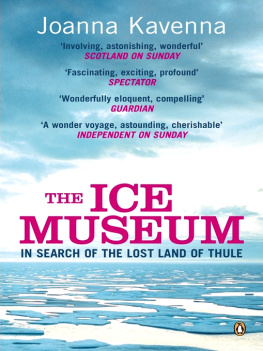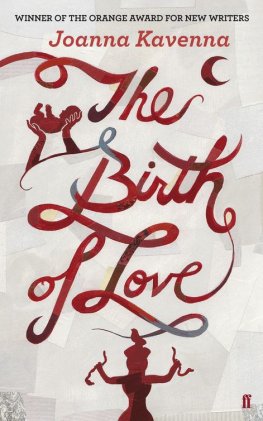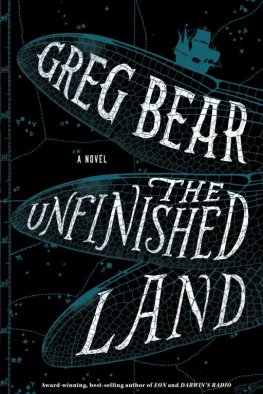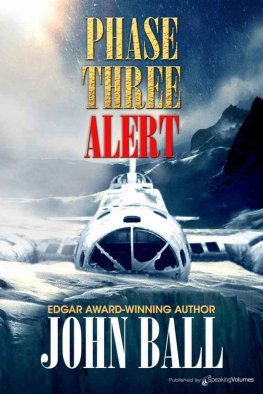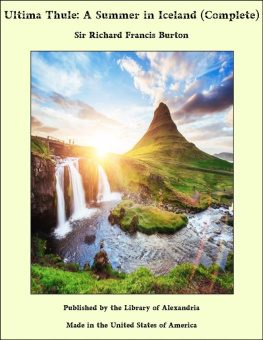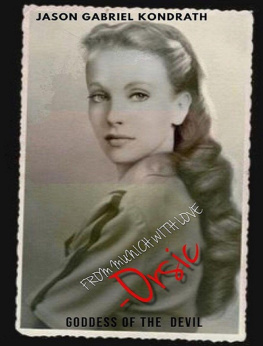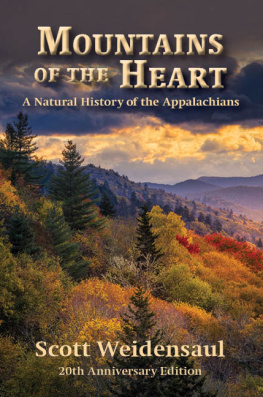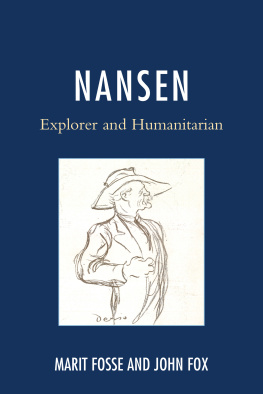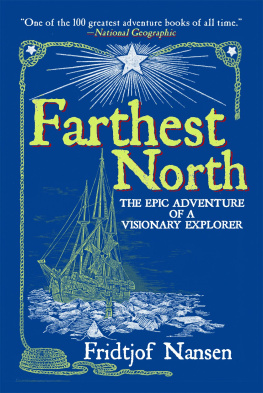ACKNOWLEDGEMENTS
For supplying the ideal environment in which to finish the book, thanks to Sir Alistair Horne and also to Sir Marrack Goulding and the Fellows of St. Antonys College, Oxford.
For formal and informal briefings along the way, thanks to President Lennart Meri, President Vaira Vike-Freiberga, former Prime Minister Mart Laar, Minister Kristiina Ojuland, Commander Neil Rasmusson, David Hempleman-Adams, Borge Ousland, Roland Huntford, Jasper Griffin, Arne Naess, Heather ODonoghue, Geir Wing Gabrielsen, Frederic Hauge, Liz Morris, Bragi Olafsson, Olav Orheim, Per Egil Hegge and Tiina Peil.
For logistical support, many thanks to the Norwegian Embassy in London, particularly to Ambassador Brautaset, Mrs. Elisabeth Mohr Brautaset, John Petter Opdahl and Anne Ulset. Thanks also to the International Press Centre in Oslo, the British Antarctic Survey and the US Embassy in Copenhagen, particularly to Alistair Thompson.
Thanks to Kim Witherspoon and David Forrer at InkWell Management and to my editor, Carolyn Carlson.
Various editors supplied me with the best kind of employment for the peripatetic writerflexible commissions which allowed me to thrash out ideas and steady my bank balance when Id spent too much money on trains and boats and planes. For this, many thanks to: Robert Silvers at the New York Review of Books; Mary-Kay Wilmers and Paul Laity at the London Review of Books; Claire Armitstead, Giles Foden and Andy Pietrasik at the Guardian; Robert McCrum and Stephanie Merritt at the Observer and Andrew Johnston at the International Herald Tribune.
For generous deeds, discussions, reading of drafts, thanks to Brian and Peggy-Lou Martin, Eyjlfur Emilsson, Arna Mathiesen, Beate Elvebakk, Hallvard Fossheim, Per Ariansen, Oystein Ska, Jonas Jlle, Ragnheidur Kristjansdottir, Svavar Svavarsson, Tim Garton Ash, Avi Shlaim, Felix Martin, Kristina Hemon, Rory Stewart, Sophie Breese, Arho Anttila, Katri Krone, Robert Macfarlane, Erik Rutherford, Beccy Asher, Tristan Quinn, Katherine Shave and Abigail Reynolds.
Many thanks to my parents and to my brother Daniel.
And most of all to Barnes.
PENGUIN BOOKS
THE ICE MUSEUM
Joanna Kavenna has worked for The New York Review of Books, The Observer, the Daily Telegraph, The London Review of Books, The Guardian, and The Times Literary Supplement, among other publications. She currently holds a writing fellowship at St. Johns College, Cambridge.
... ONLY THE PAST IS IMMORTAL.
DECIDE TO TAKE A TRIP, READ BOOKS OF TRAVEL
GO QUICKLY! EVEN SOCRATES IS MORTAL
MENTION THE NAME OF HAPPINESS: IT IS
ATLANTIS, ULTIMA THULE, OR THE LIMELIGHT,
CATHAY OR HEAVEN. BUT GO QUICKLY...
PERSONAE, DELMORE SCHWARTZ (1913-1966)
FLIGHT
... ONLY THE PAST IS IMMORTAL.
DECIDE TO TAKE A TRIP, READ BOOKS OF TRAVEL
GO QUICKLY! EVEN SOCRATES IS MORTAL
MENTION THE NAME OF HAPPINESS: IT IS
ATLANTIS, ULTIMA THULE, OR THE LIMELIGHT,
CATHAY OR HEAVEN. BUT GO QUICKLY...
PERSONAE, DELMORE SCHWARTZ (1913-1966)
Seen from above, the ice sounds a ceaseless warning. A vicious blankness emanates from the white expanse below. The shadow of the plane falls on fleeting clouds. The ice smothers forests and mountains under a thick pall. Nothing moves across the whiteness.
The plane is drifting downwards, falling towards the glazed countryside. The ice is a vista of emptiness, like a paradox, a symbol expressing the inexpressible; here is the vivid realization of absence. As the plane descends, the warning sounds insistently: LEAVE. A single syllable resounding across the smothered land. No point in coming here. The country is closed for the ice deluge, to be opened in the spring. The plane is plunging through a white sky, into banks of drifting cloud. The trees below are bleached, their branches bent under the weight of the snow. As the plane skids across the runway the trees blur into lines of whiteness.
Shaking their heads, the passengers disembark. A pale sun shines onto the rigid arms of the trees. I step slowly onto the frost-coated runway. A thick wind blasts at my body, forcing me to bend against it. A woman is signalling frantically, pointing at a bus. We all board, obediently.
In this icy landscape, it is hard to discern distance and gradient. Complex layers of vegetation are simplified into one dense line of thick snow-bound forest. Only the most violent features of the landscape remainthe most jagged and stark. Trees seem to be locked in the ice, bowed by the weight of their casing, like statues struggling to become free of a block of stone. The sun trembles above the horizon, casting squat shadows on the snow, waiting to sink into darkness again. It is a landscape ripe for fantastical embellishment; the silence invites it. Something about the brute simplicity of the nature outsidecold, white, blanksends me into thoughts of the remote and atavisticstumbling monsters, shambling old trolls, vast footprints in the snow.
Under the snow, the ice land is an anonymous world, the trees stripped of colour. The frost breath of the wind makes me blink, the frigid air rips at my lungs. The fjord is frozen, the trees are silver splinters.
I was travelling through northern lands, compelled by the endless indeterminacy of a myth: the land of Thulethe most northerly place in the ancient world. Before the regions north of Britain were mapped, there was a dream of a silent place, where the inhabitants lived under darkened skies through the winter, and enjoyed constant sunshine in the summer. A land near a frozen ocean, draped in mist. Thule was seen once, described in opaque prose, and never identified with any certainty again. It became a mystery land, standing by a cold sea. A land at the edge of the maps.
A Greek explorer, Pytheas, began the story: he claimed to have reached Thule in the fourth century B.C. He had sailed from the sun-drenched city of Marseilles to Britain. He sailed up to the north of Scotland, and then sailed onwards for about six days into the remote reaches of the ocean, until he sighted a land called Thule. There, so the story goes, the inhabitants showed him where the sun set on the shortest day. In the winter, the land was plunged into darkness. Near Thule, the sea began to thicken, and Pytheas saw the sea, sky and land merging into a viscous mass, rising and falling with the motion of the waves. He turned away from the seething semi-solid ocean, and sailed back to Marseilles.
Where was Thule? The question perplexed the ancient geographers, as they fashioned their fantastical mapsimagining the known world encircled by an impassable river, or crisscrossed by vast belts of water from Pole to Pole and around the equator. There were contenders throughout historyIceland, Scandinavia, Britainbut the precise location of Thule was never categorically determined. Thule remained a mysteryan island, shrouded in a mist, standing on the edge of a frozen ocean.
Pliny the Elder described Thule as the most remote of all those lands recorded, a place where there are no nights at midsummer when the sun is passing through the sign of the Crab, and on the other hand no days at midwinter, indeed some writers think this is the case for periods of six months at a time without a break. Virgil called it Ultima Thulefarthest Thuleemphasizing its remoteness, its status as the shadowy last country of the northern world. Strabo poured scorn on the idea. Pytheasa charlatan, wrote Strabohad made up a load of fiction about the north, and Thule was just one among the mass of lies and fables he had spun. He had said that Thule was six days sail north of Britain, which was absolutely impossible, Strabo insisted. It was obvious that Britain was the most northerly inhabited land in the world, a place where the inhabitants lived in misery because of the cold. Only Ireland was more miserable, Strabo thought, where everyone lay with their sisters and ate their parents.

